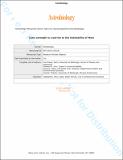Ionic strength is a barrier to the habitability of Mars
Abstract
The thermodynamic availability of water (water activity) strictly limits microbial propagation on Earth, particularly in hypersaline environments. A considerable body of evidence indicates the existence of hypersaline surface waters throughout the history of Mars; therefore it is assumed that, as on Earth, water activity is a major limiting factor for martian habitability. However, the differing geological histories of Earth and Mars have driven variations in their respective aqueous geochemistry, with as-yet-unknown implications for habitability. Using a microbial community enrichment approach, we investigated microbial habitability for a suite of simulated martian brines. While the habitability of some martian brines was consistent with predictions made from water activity, others were uninhabitable even when the water activity was biologically permissive. We demonstrate experimentally that high ionic strength, driven to extremes on Mars by the ubiquitous occurrence of multivalent ions, renders these environments uninhabitable despite the presence of biologically available water. These findings show how the respective geological histories of Earth and Mars, which have produced differences in the planets' dominant water chemistries, have resulted in different physicochemical extremes which define the boundary space for microbial habitability.
Citation
Fox-Powell , M G , Hallsworth , J , Cousins , C R & Cockell , C 2016 , ' Ionic strength is a barrier to the habitability of Mars ' , Astrobiology , vol. 16 , no. 6 , pp. 427-442 . https://doi.org/10.1089/ast.2015.1432
Publication
Astrobiology
Status
Peer reviewed
ISSN
1531-1074Type
Journal article
Description
Claire R. Cousins is supported by a Royal Society of Edinburgh Personal Research Fellowship. Funding for this work was provided by the UK Space Agency as part of the Aurora Science program. Support was also provided by Science and Technology Facilities Council (STFC) Grant no. ST/M001261/1.Collections
Items in the St Andrews Research Repository are protected by copyright, with all rights reserved, unless otherwise indicated.

